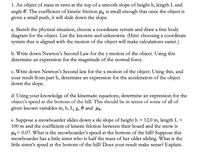
College Physics
11th Edition
ISBN: 9781305952300
Author: Raymond A. Serway, Chris Vuille
Publisher: Cengage Learning
expand_more
expand_more
format_list_bulleted
Concept explainers
Question
Solve Part d and Part e

Transcribed Image Text:1. An object of mass m rests at the top of a smooth slope of height h, length L and
angle 0. The coefficient of kinetic friction uk is small enough that once the object is
given a small push, it will slide down the slope.
a. Sketch the physical situation, choose a coordinate system and draw a free body
diagram for the object. List the knowns and unknowns. (Hint: choosing a coordinate
system that is aligned with the motion of the object will make calculations easier.)
b. Write down Newton's Second Law for the y motion of the object. Using this
determine an expression for the magnitude of the normal force.
c. Write down Newton's Second law for the x motion of the object. Using this, and
your result from part b, determine an expression for the acceleration of the object
down the slope.
d. Using your knowledge of the kinematic equations, determine an expression for the
object's speed at the bottom of the hill. This should be in terms of some of all of
given known variables m, h, L, g, 0 and µk.
e. Suppose a snowboarder slides down a ski slope of height h = 12.0 m, length L=
100 m and the coefficient of kinetic friction between their board and the snow is
Hk= 0.07. What is the snowboarder's speed at the bottom of the hill? Suppose this
snowboarder has a little sister who is half the mass of her older sibling. What is the
little sister's speed at the bottom of the hill? Does your result make sense? Explain.
Expert Solution
arrow_forward
Step 1
d. Let's make diagram according to the situation.
_1.jpg)
Let
m= mass of an object
h= intial height
L = distance travelled along slope
@= anlgle of inclination
uk= coefficient of kinetic friction
To find ,
An expression of speed of an object at the bottom of the hill.
Step by stepSolved in 4 steps with 3 images

Knowledge Booster
Learn more about
Need a deep-dive on the concept behind this application? Look no further. Learn more about this topic, physics and related others by exploring similar questions and additional content below.Recommended textbooks for you
 College PhysicsPhysicsISBN:9781305952300Author:Raymond A. Serway, Chris VuillePublisher:Cengage Learning
College PhysicsPhysicsISBN:9781305952300Author:Raymond A. Serway, Chris VuillePublisher:Cengage Learning University Physics (14th Edition)PhysicsISBN:9780133969290Author:Hugh D. Young, Roger A. FreedmanPublisher:PEARSON
University Physics (14th Edition)PhysicsISBN:9780133969290Author:Hugh D. Young, Roger A. FreedmanPublisher:PEARSON Introduction To Quantum MechanicsPhysicsISBN:9781107189638Author:Griffiths, David J., Schroeter, Darrell F.Publisher:Cambridge University Press
Introduction To Quantum MechanicsPhysicsISBN:9781107189638Author:Griffiths, David J., Schroeter, Darrell F.Publisher:Cambridge University Press Physics for Scientists and EngineersPhysicsISBN:9781337553278Author:Raymond A. Serway, John W. JewettPublisher:Cengage Learning
Physics for Scientists and EngineersPhysicsISBN:9781337553278Author:Raymond A. Serway, John W. JewettPublisher:Cengage Learning Lecture- Tutorials for Introductory AstronomyPhysicsISBN:9780321820464Author:Edward E. Prather, Tim P. Slater, Jeff P. Adams, Gina BrissendenPublisher:Addison-Wesley
Lecture- Tutorials for Introductory AstronomyPhysicsISBN:9780321820464Author:Edward E. Prather, Tim P. Slater, Jeff P. Adams, Gina BrissendenPublisher:Addison-Wesley College Physics: A Strategic Approach (4th Editio...PhysicsISBN:9780134609034Author:Randall D. Knight (Professor Emeritus), Brian Jones, Stuart FieldPublisher:PEARSON
College Physics: A Strategic Approach (4th Editio...PhysicsISBN:9780134609034Author:Randall D. Knight (Professor Emeritus), Brian Jones, Stuart FieldPublisher:PEARSON

College Physics
Physics
ISBN:9781305952300
Author:Raymond A. Serway, Chris Vuille
Publisher:Cengage Learning

University Physics (14th Edition)
Physics
ISBN:9780133969290
Author:Hugh D. Young, Roger A. Freedman
Publisher:PEARSON

Introduction To Quantum Mechanics
Physics
ISBN:9781107189638
Author:Griffiths, David J., Schroeter, Darrell F.
Publisher:Cambridge University Press

Physics for Scientists and Engineers
Physics
ISBN:9781337553278
Author:Raymond A. Serway, John W. Jewett
Publisher:Cengage Learning

Lecture- Tutorials for Introductory Astronomy
Physics
ISBN:9780321820464
Author:Edward E. Prather, Tim P. Slater, Jeff P. Adams, Gina Brissenden
Publisher:Addison-Wesley

College Physics: A Strategic Approach (4th Editio...
Physics
ISBN:9780134609034
Author:Randall D. Knight (Professor Emeritus), Brian Jones, Stuart Field
Publisher:PEARSON